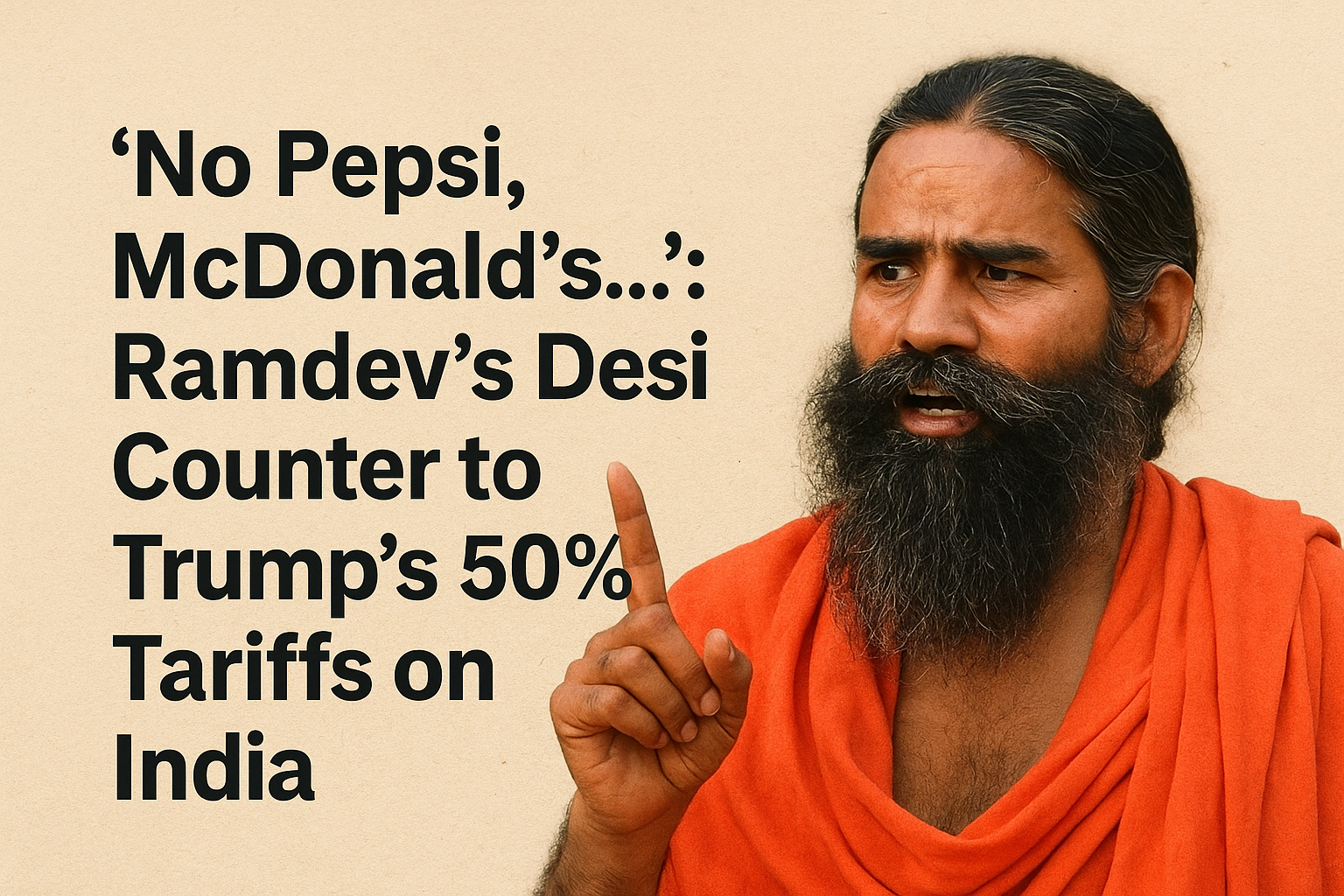‘No Pepsi, McDonald’s…’: Ramdev’s Desi Counter to Trump’s 50% Tariffs on India
,New Delhi, August 28, 2025 — Baba Ramdev, the yoga guru turned nationalist firebrand, launched a fierce attack on the United States in response to President Donald Trump’s sweeping new tariffs on Indian goods. With rhetorical intensity and cultural fervor, he urged Indian citizens to boycott American brands—calling for a campaign of economic resistance rooted in “Swadeshi” and self-reliance.
The Tariffs That Sparked Backlash
On August 27, 2025, President Trump’s administration enforced a new 25% tariff on select Indian goods—added atop an existing 25% duty—bringing total U.S. tariffs on Indian exports to 50%. The escalation is part of a response to India’s continuing purchases of Russian oil and stands as one of the steepest trade escalations in recent U.S.–India relations. The increased duties now cover a wide range of goods, including garments, gems, jewelry, footwear, sporting goods, furniture, and chemicals.Hindustan TimesGlobal News
Ramdev’s Reaction: A Call for Total Boycott
Immediately after the tariffs took effect, Ramdev spoke out forcefully. Branding the move as “political bullying, hooliganism and dictatorship,” he urged:
“Indian citizens should strongly oppose the 50 per cent tariffs that America has imposed on India. American companies and brands should be completely boycotted.”Hindustan Times
He specifically targeted consumer-facing U.S. brands:
“Not a single Indian should be seen at the counters of Pepsi, Coca-Cola, Subway, KFC, or McDonald’s. There should be such a massive boycott … If this happens, chaos will ensue in America. Inflation will increase in America to the point where Trump himself may have to retract these tariffs.”Hindustan TimesThe Economic Times
In a more colorful condemnation reported by ABP Live, he characterized Trump as duplicitous:
“A nation that gains immense wealth often falls into luxury. … No one changes colours as often as [Trump] does. … His approach is not just bullying; he’s become a goon.” He urged Indians to “not buy Coca-Cola, Pepsi, McDonald’s, or KFC. Use an old phone for some time. Boycott Apple.”ABP Live
Echoing these sentiments in a TV interview, Ramdev depicted the U.S. as acting like an adversary:
“America is behaving like an ‘enemy nation’ … Everyone should resolve to boycott US-made products.”India Today
Swadeshi Sentiment: Beyond a Yoga Guru’s Call
Ramdev’s message transcends spiritual influence—he tapped into a long-standing push for Swadeshi (indigenous goods) that’s been amplified by ideological groups and echoed by other prominent figures. For instance, RSS chief Mohan Bhagwat, speaking on the same day, advocated promoting self-reliance:
“Swadeshi is important, why buy from outside what is available at home,” he asserted, emphasizing that international trade “should be on our own terms, not under duress.”Hindustan Times
This trend aligns with India’s broader “Vocal-for-Local” and “Make in India” movements, reinforced by Prime Minister Modi’s continual emphasis on easing dependence on foreign goods and strengthening indigenous supply chains.ReutersHindustan Times
Economic Reality: Tariffs, Risks, and Responses
The 50% tariffs pose serious challenges to India’s export sectors. According to analysis from Global Trade Research Initiative, labor-intensive industries—textiles, gems, jewelry, leather goods, furniture, and beyond—are especially vulnerable. Loss of access to U.S. markets threatens jobs and growth, raising concerns in export-driven regions like Gujarat.Global NewsReuters
In retaliation, the Indian government has begun exploring domestic reforms—lowering goods and services taxes ahead of Diwali, offering favorable bank loans to exporters, and accelerating trade talks with alternative partners in Latin America, Africa, Southeast Asia, and the European Union.Global News
Public Reactions: From Defiance to Indifference
While nationalism is mounting, public response remains varied. Reuters reports a wave of calls to boycott major U.S. companies—McDonald’s, Coca-Cola, Amazon, Apple—as political protest movements gain online traction and some offline rallies organized by groups like Swadeshi Jagran Manch.Reuters
Yet, everyday motivations appear more pragmatic. A Lucknow customer at McDonald’s stated:
“Tariffs are a matter of diplomacy and my McPuff, coffee should not be dragged into it.”Reuters
This illustrates the ongoing tension between nationalist sentiment and consumer convenience.
Broader Context: What’s at Stake
1. Impact on Bilateral Relations
The dramatic hike in tariffs and the ensuing backlash have jolted U.S.–India ties. Once strategic partners, the two sides now appear locked in a confrontation with shifting economic alliances and diplomatic strains.Hindustan TimesGlobal NewsReuters
2. Symbolism of Consumer Boycotts
Ramdev’s “No Pepsi, McDonald’s…” chant is a direct attack on symbols of globalization and Western influence. It seeks to tap into cultural pride and national unity, resonating with India’s legacy of domestic self-sufficiency.
3. Swadeshi as Soft Power and Strategy
The growing movement to buy Indian-made goods is framed not just economically, but ideologically. It aligns with governance models that emphasize local empowerment, domestic innovation, and reduced foreign dependence.ReutersHindustan Times
4. Diplomatic and Trade Diversification
India’s push to seek new partners and strengthen ties beyond the U.S. reflects both pragmatism and urgency. Trade negotiations with other nations and blocs are being expedited to cushion the blow and secure alternative markets.
In response to President Trump’s unprecedented 50% tariffs, Baba Ramdev’s “No Pepsi, McDonald’s…” decree imagines an India rallying behind Swadeshi values—using boycott as a strategic weapon. His rhetoric blends moral urgency and political symbolism, urging Indians to reject American corporate icons and embrace domestic alternatives.
Yet, beneath the slogans lies a challenging economic reality: injured exporters, disrupted supply chains, and global shifts in trade strategies. While nationalist fervor may embolden many, the real test lies in translating sentiment into resilient, sustainable growth.
If Indians do walk away from U.S. brands—choosing “old phones” over newer ones, preferring nashta from local manufacturers over global chains—the symbolic strike may well become a catalyst. But whether it will “make Trump retract the tariffs” remains to be seen. Until then, India’s path forward weaves between cultural pride, diplomatic recalibration, and economic resilience.





